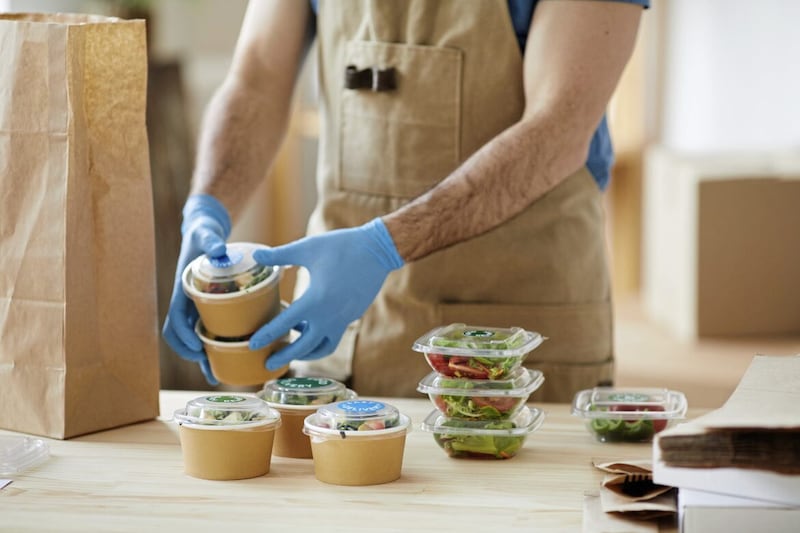WITHIN all crises, there are opportunities, and people and companies change behaviours to adapt. During the pandemic, amidst all of the bad news, there were many positive stories of people pivoting to meet the challenge. There were a wide range of heroes, and this included companies - those producing PPE, those keeping the supply chains turning in food provision, and those enabling and supporting the vital digital transformation.
The pandemic is receding, but a new crisis is emerging, one that relates to the cost and supply of food. Whilst the pandemic didn't create the food supply issue that many feared, the crisis in food driven by the Russian invasion of Ukraine will bring a very real challenge.
In the lead up to the Assembly elections in May, we will likely hear the term 'bread and butter issues' many times. This is used as a metaphor relating to more mundane, everyday politics. But in the current environment, literal bread and butter will be central to what happens in politics across Europe and beyond.
People get angry when they can't get their bread. And if there are any modern-day Marie Antoinette's out there suggesting let them eat avocados - these green fruits from Mexico are going through the roof too. One avocado index has them rising by 81 per cent year-to-date to a 24-year high.
Consumer goods inflation is already at a 30-year high of 6.2 per cent with the expectation that it will hit 9 per cent - a level not seen since the early 1980s. Oil, gas, petrol and diesel prices have all surged dramatically. Home heating oil for instance doubled in the space of a fortnight. Russia's invasion of Ukraine has been the catalyst for an explosion in global commodity prices.
From a business perspective, those companies most affected by energy prices hikes are in the food and drink sector. This includes the hospitality industry as well as food producers and processors. As of last month, 60 percent of UK food and drink firms were adversely affected by the energy crisis (e.g. it affected production or supply) compared to 38 per cent across all sectors. Sectors such as real estate and IT were least affected.
And we need to remember that food and drink businesses have already been more affected than other sectors by the UK exiting the EU. This is in terms of experiencing additional transport costs and increased red tape. On these two measures, twice as many firms are adversely affected by these than UK businesses as a whole. And in the case of NI, the costs experienced are even greater.
But whilst the energy crisis is very much here and being felt by everyone including consumers and businesses, the food crisis though has received less attention. World food prices have risen by 34 per cent y/y - that's the fastest rise in 14 years - and stood at a record high in March. Prices are now up 67 per cent in just two years.
The Ukraine-Russia conflict has in effect pitted two agricultural superpowers against each other, turning the so-called bread-basket of Europe into a war zone. Wheat prices have jumped by one-fifth since war broke out, further rises will follow.
So, whilst supply chain disruption from the pandemic is receding, supply chain disruption from the war is really only beginning and it will have severe repercussions across food, energy, metals and chemicals. Russia is a key producer of palladium which is used in catalytic converters, nickel which is used in batteries, and neon (90 per cent of the world's supply) which is critical for micro chips for cars.
The reality is that Russia and Ukraine are two of the most important producers and exporters of agricultural commodities in the world. Overall, the two countries export one in eight of all calories traded worldwide. What Saudi Arabia is to oil, Ukraine and Russia are to cereal crops. Just to put the scale of Ukraine's crops in context. The top six crops grown in Ukraine (wheat, barley, rape seed) account for 59 million hectares. That is equivalent to the UK completely covered in crops.
And don't forget that cereal crops aren't just a direct source of food, they are also a major indirect source of food in that they are fed to the livestock that we then consume.
Current hostilities mean that even last year's crops are unable to be exported whilst even planting this year's crops - which would normally be starting now - will be a major challenge. Ukraine's agriculture minister anticipates that only half of the country's land usually used for planting will actually be available for planting.
And many farmers have downed tools and picked up arms. Russia and Ukraine are also major exporters of fertiliser, as well as some of the key chemicals used in fertiliser, along with Belarus. Shortages of supply of fertiliser will impact on the rest of the world's ability to grow an adequate supply of food.
All of this means that there will be a supply shock soon to come and that will lead to a price shock. Parts of the Middle East and Africa are heavily reliant on wheat from Ukraine and Russia. Food shortages and price spikes a decade ago led to disorder that fuelled the Arab Springs, and those price spikes may have nothing on what is to come this year.
But whilst there are many challenges, there are also opportunities for the food and drink sector. We have already talked about economic nationalism and the reality is when there are supply chain issues, you source from your closest markets.
For Northern Ireland, this means that the UK market will become more dependent on food supply from Northern Ireland. We have already seen a reconfiguration of food supply chains across the UK and the same is true on an all-island basis. For UK food and drink firms, more than half say they are using more UK suppliers than in the past. We will also likely see Northern Ireland move more towards self sufficiency in food, in the same way we are moving more towards energy self-sufficiency.
But perhaps more significantly, pricing power has moved more towards producers. With higher prices, it means communication between producers and retailers, rather than negotiation. Whilst this isn't necessarily good for consumers, it does provide positives for farmers and processors.
Farmers over the years and generations have proven themselves to be resilient and to be able to adapt to change. We need them to continue to adapt to meet the food supply issues facing us today. And the same applies to the entire food supply chain from farm to fork. But with the era of cheap food now at an end, consumers need to adapt as well. And the scale of the challenge also requires intervention from government.
There are strategies in place to secure our energy supply. We also need strategies to secure our food supply and provide affordable food for everyone in society. Bread and butter issues are local and have gone global too.
Richard Ramsey is Northern Ireland chief economist at Ulster Bank







